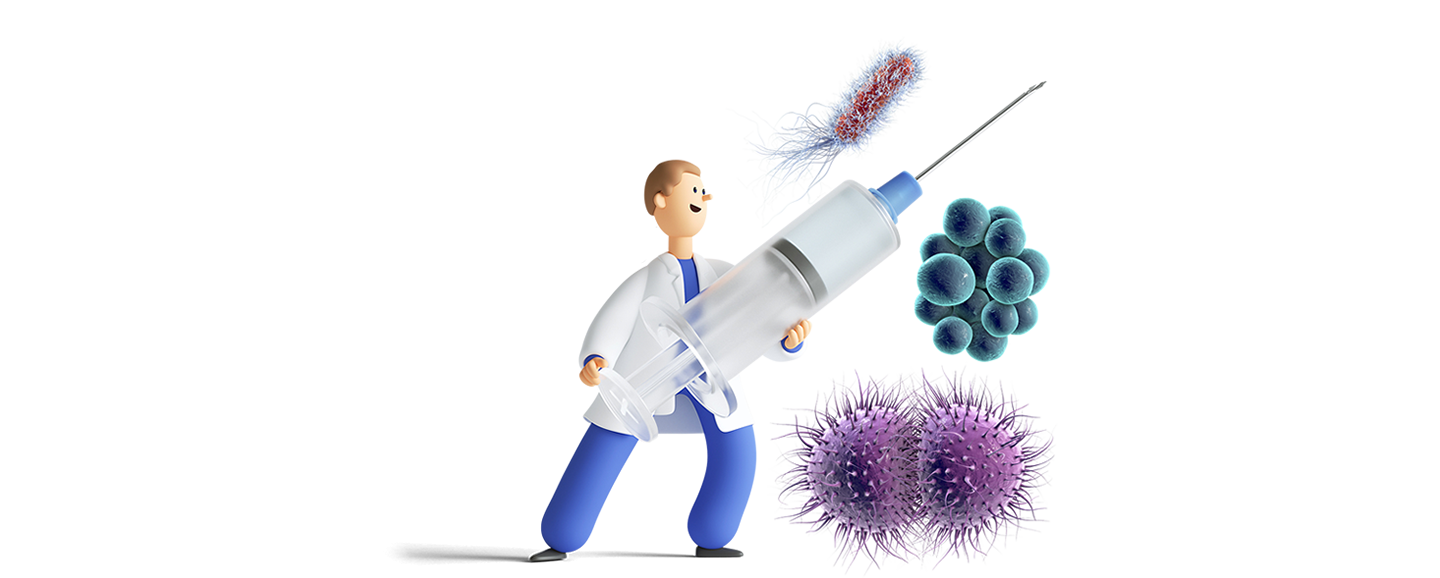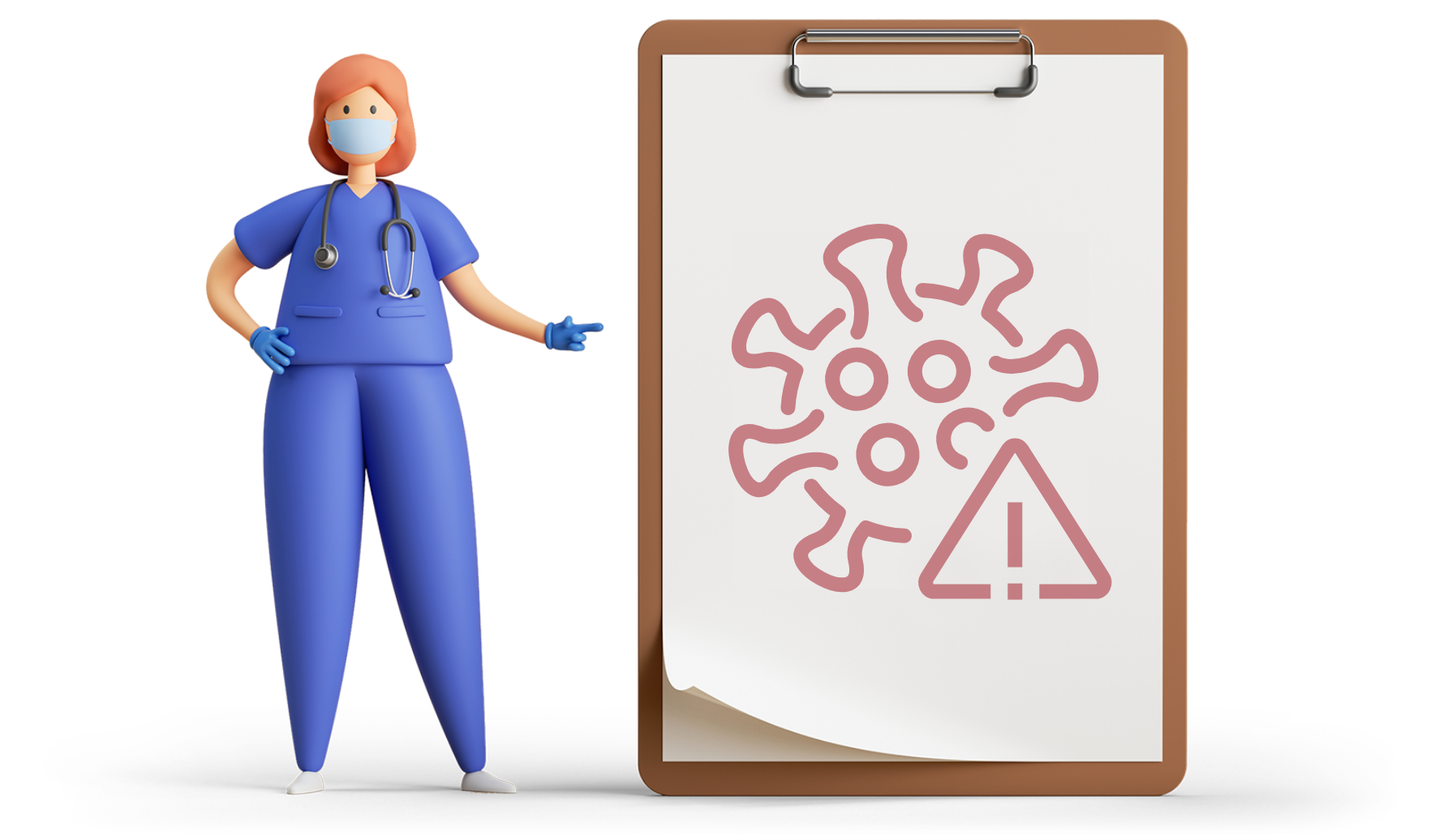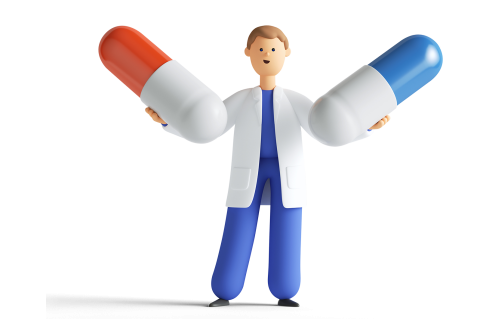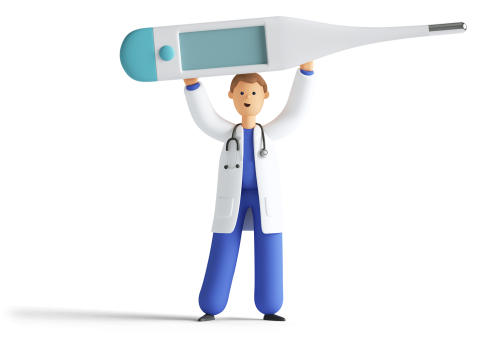
Superbugs
Be aware of them
What are superbugs?
Superbugs are strains of bacteria, viruses, parasites, and fungi that are resistant to most of the antibiotics and other medications commonly used to treat the infections that they cause. Since the inception of antibiotics, the bacteria they treat have been adapting and changing in order to build up resistance. These antibiotic-resistant bacteria are called superbugs, and they can cause severe bacterial infections that are extremely difficult to treat. (1)
Germs constantly evolve to survive. They find new defense strategies to overcome the effects of antibiotics called «resistance mechanisms». DNA tells the germ how to make specific proteins which determine the germ’s resistance mechanisms. These mechanisms can change over time and lead to more resistant infections. (2)
Furthermore, antibiotic-resistant germs can share their resistance genes with other bacteria that have not been exposed to antibiotics through a mechanism that helps them continue multiplying: (2)
- The antibiotic kills as many susceptible germs as it can, but a small number of resistant germs may survive the treatment (3)
- These stronger bacteria then multiply and become dominant, passing on their antibiotic resistant genes (3)
- Resistant bacteria can spread and cause an infection that is more difficult to treat with the same antibiotics (3)
- If an infection does not respond well to the initial antibiotic, it is treated with an alternative. Any bacteria that survives the action of the second antibiotic treatment may slowly develop resistance to it over time (3)
- As this cycle continues, the ability of bacteria to adapt, allows them to survive many different antibiotic treatments and they become multidrug-resistant superbugs (3)
The germs develop resistance mechanisms by:
- Developing new cell processes that avoid using the antibiotic’s target (2)
- Changing or destroying the antibiotic with enzymes - proteins that break down the drug (2)
- Restricting access to the antibiotic by changing the entry points to the pathogen or limiting their number (2)
- Germs change the antibiotic’s target so the drug can no longer fit and do its job (2)
- Germs get rid of antibiotics using pumps (2)
What consequences are associated with infections caused by superbugs?
When a superbug is implicated in an infection, patients can present with widely varying symptoms. Common symptoms of infection include:
- Fever
- Fatigue
- Diarrhoea
- Cough
- Body aches
The symptoms of infection caused by a superbug resemble those of a susceptible bacterial infection; the only difference is that the infection caused by a superbug does not respond to medications so the symptoms do not improve. (9)
Some people, infected with a superbug, develop no symptoms at all – they are colonised. Healthy colonized people carrying germs without being symptomatic and aware, can infect vulnerable people unknowingly. (9)
Resistance to key antibiotics that superbugs have developed, complicates patient management as doctors are forced to try one drug after another to treat hospital-acquired infections. Superbugs already cause many post-surgical infections making routine surgery more dangerous. Superbugs present a very real threat to health care including cancer chemotherapy, births by cesarean section, and organ transplantation. (10)
How to prevent the spread of superbugs?
In the past, some of the most dangerous superbugs have been confined to health care settings. That’s because people who are sick or in a weakened state are more susceptible to picking up infections. But superbug infections aren’t limited to hospitals and, if some strains are out in the community, anyone, even healthy people, can become infected. (6)
Ideally, doctors should be able to quickly identify the right antibiotic to treat a particular infection. Laboratory tests and analysis requires days or even weeks to test and identify the bacterial strain. (6)
Improving the use and development of diagnostics is essential, as well as rapid laboratory tests, to help identify the bacteria especially in resistant infections, in order to ensure the right antibiotic is used at the right time for right infection. (2)
Local and global strategies aiming to prevent antibiotic-resistance have been developed in recent years, with specific advice and guidance for healthcare providers, hospitals and citizens. (2)
New antibiotics are an important element in the fight against antibiotic resistance and can help improve treatment options and outcomes, especially against resistant infections. However, the fight against antibiotic resistance cannot rely on drug development alone. (2)
Important steps to prevent the spread of infections caused by superbugs could be shared globally by: (2)
- Using data to detect and track resistance through, for example national lab networks (2)
- Providing resource and expertise in response to an outbreak via infection prevention and control measures (2)
- Improving antibiotic use at all levels, providing evidence and tools for facilities to implement antibiotic stewardship practices, collaborating with food partners to ensure optimal veterinarian antibiotic use to treat, control, or prevent infections and programs (2)
- Identifying gaps in knowledge related to resistance, the environment, and human and animal health (2)
- Finding innovative ways to prevent infections with drugs, diagnostics, and vaccine development (2)
What can I do to prevent the spread of superbugs’?
Responsible use of antibiotics can help stop resistant bacteria from developing and help keep antibiotics effective for the use of future generations, and it’s everyone's responsibility. It is therefore important to know when it is appropriate to take antibiotics and to take them responsibly. (11)
Antibiotic-resistant germs can spread between people with or without signs and symptoms of infection. Close contact with people or animals carrying a resistant germ, drinking contaminated water or touching contaminated surfaces could put your health at risk. (2)
Observing a few simple rules everyday could help prevent the spread of bacteria:
- Washing your hands regularly with soap and water is one of the best ways to prevent infections, sickness, and prevent spreading germs (2)
- Getting vaccinated is an important step to prevent infections, including resistant infections (2)
- Be aware of changes in your health, recognizing signs and symptoms of infection (2)
- Use antibiotics appropriately as prescribed by your doctor and complete the course even if you feel better. When used incorrectly they can lead to antibiotic resistance (2)
- Practice healthy habits around animals, wash your hands after touching, feeding, or caring for animals, and keep your animals healthy (2)
- Prepare food safely to avoid foodborne infections. Clean everything accurately, cook foods to safe temperatures and handle leftovers and other foods promptly (2)
- Stay healthy when traveling abroad, know what vaccinations are needed, check health alerts, stick to safe food and drinks, plan in advance in case you get sick, and learn about the risks of medical tourism (2)
- Prevent Sexually transmitted diseases by lowering your risk with proper protection (2)
Prudent antimicrobial use provides benefits to the patient and at the same time minimizes the probability of adverse effects and the emergence or spread of Antimicrobial resistance. (12)
MC-ID-02-2021
- www.aftermath.com/content/superbug-infection-bacteria
- www.cdc.gov/DrugResistance/Biggest-Threats.html
- www.medicalnewstoday.com/articles/327093#symptoms
- www.who.int/news-room/detail/27-02-2017-who-publishes-list-of-bacteria-for-which-new-antibiotics-are-urgently-needed
- www.scientificamerican.com/article/who-releases-list-of-worlds-most-dangerous-superbugs/
- NIH News IN Health | Stop the Spread of Superbugs
- https://www.cdc.gov/hai/organisms/vre/vre.html
- https://www.vdh.virginia.gov/epidemiology/epidemiology-fact-sheets/vancomycin-resistant-enterococci-vre-infection
- https://www.healthline.com/health/superbug#symptoms
- https://www.cbc.ca/news/health/world-health-organization-superbugs-1.3998697
- https://antibiotic.ecdc.europa.eu/en/get-informed/factsheets/factsheet-general-public
- EU Guidelines for the prudent use of antimicrobials in human health



